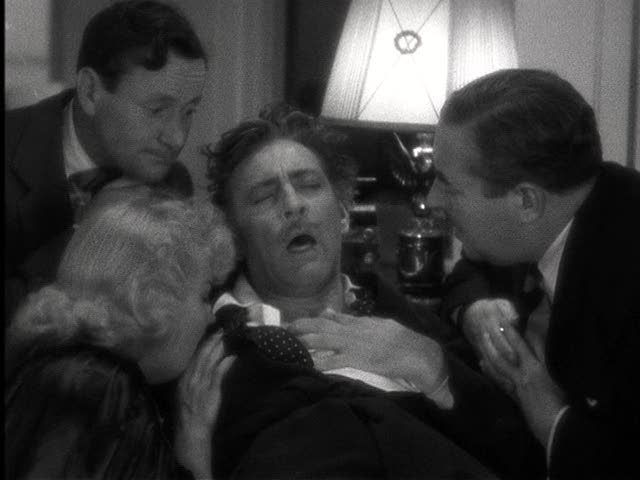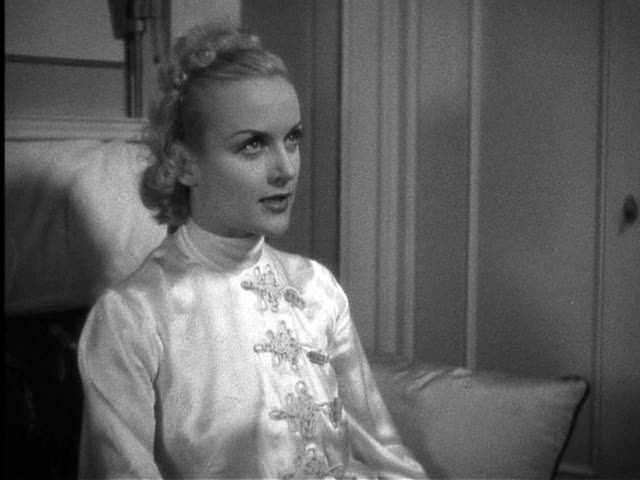
Howard Hawks' Twentieth Century is a hilarious story about people who "are only real in between curtains," who only exist as actors playing roles rather than people with real lives. When the egomaniacal Broadway director Oscar Jaffe (John Barrymore) first meets his new starlet (Carole Lombard), he dispenses with her old name and gives her a new, more glamorous one, Lily Garland, then immediately tells her that's she no longer Lily Garland, but should instead inhabit her role in the play completely. Within the space of a few minutes in Jaffe's company, she has become two layers removed from her original self, an actor playing an actor playing a part. "You are no longer Lily Garland," he howls to her, waving his hands dramatically, as though she had already become too invested in a name he'd given her only minutes before. It's a prophetic moment, because before too long the young girl — previously a lingerie model with no acting experience — is the biggest star on Broadway, as well as Jaffe's lover and his meal ticket, driving his plays to mammoth success. But the film is not a love story, at least not in any ordinary sense, despite the romance between the director and his greatest star. Instead, Hawks treats the story like a tongue-in-cheek melodrama, a melodrama that realizes its own essential mawkishness and silliness, and amps up the ham accordingly.
Indeed, ham is hardly an adequate word to describe what Barrymore and Lombard do with these performances. They're playing characters who are always acting, who think of ordinary encounters as "scenes" to be played, and the people around them as extras in the grand epic of their own lives. They treat emotions like notes to be hit and held, pulling out a bit of anger here, a touch of suicidal angst there, screams and cries and moans like melodies to be wrung from their throats. They write their own speeches as they talk to one another. There's no such thing in this film as a simple conversation: everything is an oration, the two sparring lovers trading monologues and orchestrating curtain-calls even when there's no audience except one another. In an odd, masochistic way, it's obvious that they're perfect for each other, though Jaffe drives Lily away with his dictatorial nature; the last straw is when he hires a private detective to spy on her. So Lily heads off to Hollywood to become an even bigger star, while Jaffe flounders, his plays failing miserably in her absence. It's hard to blame Lily for leaving this blowhard, though the great irony — Jaffe might say "the final irony," as he does at several points — is that before she leaves he succeeds in making her just like him. The result is that she's not happy unless she's performing, and she's dissatisfied with men who lack a sense of drama: she is infuriated when her new beau (Ralph Forbes) has the temerity to walk out on her before she finishes her great speech telling him to leave.
Hawks has the perfect sensibility for this florid material, realizing that there's a very fine line between melodrama and comedy, a line that can be easily erased when it needs to be. This isn't the camp humor that sometimes arises from particularly pungent melodrama, but a comedic sensibility that is completely immersed in the story and the characters. These characters are just inherently funny, and Hawks is perfectly attuned to the rhythms that accentuate this humor. He knows to linger on Jaffe's melodramatic exits long enough to catch the trailing of the director's hand along the door on the way out, a conscious gesture meant to draw attention to its tortured grip on the doorjamb. Hawks also knows when to pull in for closeups, to catch Barrymore's arched eyebrows and the facial contortions that indicate Jaffe's hammy acting. Barrymore has a tricky part. He can't just be a ham, but has to play a character who's a ham. As a consequence, there's a self-consciousness in his performance that adds a meta-layer to the film: it's perfectly possible to laugh at Jaffe's absurd histrionics and still realize that Jaffe himself takes all of this seriously.

For her part, Lombard keys her performance to match and exceed Barrymore's wherever possible. In the best of their scenes together, it's like watching a duel to see who can be more ridiculous, more melodramatic: the first actor to give in and let a genuine, believable emotion show is the loser. This is the nature of the relationship between Jaffe and Lily. There's a core of love there somewhere, and certainly mutual respect for one another as artists, but there's also a competitive spirit, a sense that they're performing for one another, trying to outdo one another, to craft the grandest, most showstopping performance, the piece of acting genius that will silence the other with awe. Again, these scenes also function on the meta-layer, where Lombard and Barrymore are engaged in a similar duel of acting prowess, their voices overlapping in Hawksian style, fighting with one another for control of the scene. They're hilarious and irresistible together, and only Hawks could make such a pair of shrill, overacting brawlers so compulsively entertaining.
The absurdity of the melodrama is also accentuated by a pair of pitch-perfect straight men, Jaffe's loyal assistants Webb (Walter Connolly) and O'Malley (Roscoe Karns). These two play off of their boss brilliantly, rolling with his punches and setting up his craziest moments with their own straight-laced reasonableness. The scenes between them are masterpieces of balance and subtlety, with Hawks capturing Jaffe's manic over-emoting and his lackeys' exasperated stoicism in the same frame. In one scene, Jaffe paces back and forth frantically, orating about his plans for his next great scheme, while O'Malley sits off to the right side of the frame, a bemused smirk on his face, furtively nipping at his ever-present bottle to steel himself against his boss' megalomania. In another scene, Jaffe has fired Webb (one of many times he does so) and then completely forgotten about it as he goes on directing the play. Webb comes storming back in a few minutes later to return the combination to the safe, and Jaffe, almost without even looking at him, asks why he's bothering him with such trivialities during rehearsals. Hawks stages the scene as a two-shot, with Jaffe facing the camera and Webb just behind him, flustered and nonplussed by his boss' volatility. Jaffe's melodramatic flailing is foregrounded, while Webb provides a subtle background element, a quiet comedic counterpoint to the shot's main focus. The film works so well because, in small ways like this, Hawks makes himself complicit in Jaffe and Lily's egocentric worldviews: he makes them the grand players they demand to be, and celebrates their ridiculousness and humor in every moment of the film.
This movie is a non-stop riot. I'm laughing to myself as I recall every scene you mention.
ReplyDeleteLombard always credited Barrymore with helping her unveil a comedic side to her that people who knew Carole in real life were familiar with, but one she really hadn't put forth on screen. (Hawks helped in her development, too.) Lombard returned the favor to Barrymore in 1937 by getting him a key supporting role in "True Confession," at a time when alcohol and other personal problems were causing his star to wane.
ReplyDeleteEven though this film was shot and released before the Production Code was strictly enforced, a publicity still from the movie was banned from release by Joseph Breen; it's arguably the sexiest still Lombard ever did. See it, and learn more about it, at http://community.livejournal.com/carole_and_co/62897.html
I had no recollection of having seen 'Twentieth Century', so I gave it a go last week with the high expectations of a Lombard and Hawks fan. Actually, the "Repent" stickers gimmick rang a bell, leading me to think I had indeed watched it somewhere in the past, but had almost forgotten everything. And probably will again, as in my opinion this is a rather deceptive movie.
ReplyDeleteIts main flaw lies in my view in a total lack of chemistry between the main characters : Lombard and Barrymore may appear as good friends, they may seem happy to play together, nevertheless I'm at a loss to witness any kind of sexual tension between Jaffe and Garland. It might mainly be so because Lily's progression, as duly pointed in this review, makes her become so much like Oscar.
Now, in many of Hawk's films the sexual tension is magistrally built upon distance, not proximity. It is distance that brings attraction, conflict as well (hence rythm) and in Hawk's best comedies it is also a major source of laughter, the latter being another way to evacuate the pressure of these 'skirmishes of the sexes'.
Here, the closeness makes it more, as noted again, look and sound like a contest than like a match (and in a Hawks film, couldn't we all... use a match ?). So I guess the way the script develops is entirely to blame, and at least for me however talented everybody may be, 'Twentieth Century' quickly falls flat.
Though, the opening scenes are promising, as Barrymore and Lombard make a credible predator and ingenue. But the potential of the situation is hardly used, and there is actually more magic in the few scenes between Katharine Hepburn and Adolphe Menjou in La Cava's 'Stage door' than in the whole 'Twentieth Century'. And the two spies (Dietrich and McLaglen) in Sternberg's 'Dishonored' pay a much more pleasant tribute to 'people who only exist between curtains'.